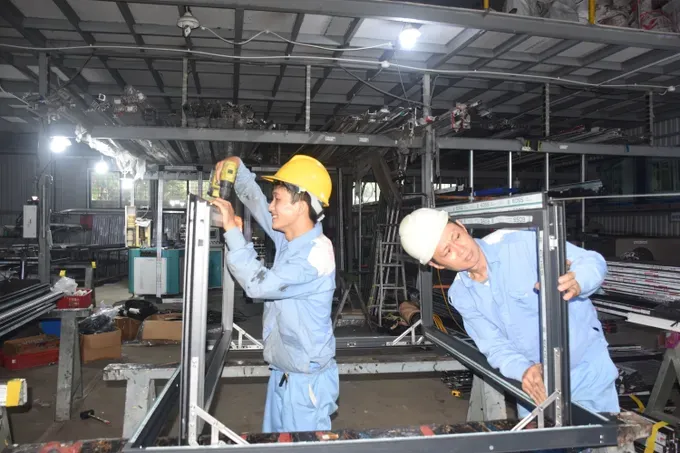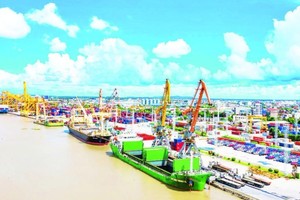
SMEs are lifeblood of the country’s economy
At 8 a.m., the factory of Huynh De Door Engineering Company at 42A 30-4 Street in Ho Chi Minh City’s Tam Thang Ward is already bustling with activity. Dozens of workers operate aluminum cutting and CNC arch-bending machines, producing finely crafted, precision-engineered aluminum and glass doors.
Director Nguyen Thanh Son of Huynh De Door Engineering Company shared that the company is one of many small businesses within Ho Chi Minh City’s SME community. Established in 2014 with modest capital and about ten employees focused on aluminum and glass door fabrication, the company has, after ten years, expanded into large glass façade installations, glass canopies, automatic doors, aluminum and glass window systems, and European-imported door lines—especially aluminum arch bending, a technique requiring exceptional precision and expertise.
Alongside investments in equipment, Huynh De Company has also adopted digital management tools. MISA accounting software ensures transparent financial oversight, while Getfly CRM optimizes workflows, project management, and customer service. The company also applies the ISO 9001:2015 quality management system to maintain high production standards. Today, its annual revenue reaches around VND20 billion (US$759,747), providing stable employment for nearly 20 workers.
Having operated for nearly 20 years, Vung Tau Clean House JSC consistently secures hundreds of long-term and seasonal contracts each year for industrial cleaning, property maintenance, and office care services. Among its regular clients are major corporate customers with annual service agreements. Although a small enterprise in Ho Chi Minh City’s SME network, Vung Tau Clean House Company provides jobs for 100–200 workers during peak periods.
Nearly 600,000 small and medium-sized enterprises (SMEs) operating in Ho Chi Minh City have generated substantial practical value, contributing significantly to the city's economic development. Their impact underscores the growing importance of the private sector as a vital driving force behind Vietnam’s economic progress. Notably, SMEs account for approximately 98 percent of all registered businesses in the city, and the vast majority of these are privately owned.
President Pham Van Triem of the Ho Chi Minh City Association of Small and Medium-Sized Enterprises revealed that currently, the total budget revenue generated by enterprises across the city is estimated at approximately VND480 trillion. These businesses also provide stable employment for around 4 million workers across a wide range of sectors. Within this landscape, small and medium-sized enterprises play a pivotal role in key areas such as manufacturing, trade, services, supporting industries, and logistics.
Favorable environment for the SME growth is created
The figures presented above underscore the growing strength and influence of small and medium-sized enterprises (SMEs) in driving the development of Vietnam’s private sector economy. However, to unlock their full potential, SMEs require bold and breakthrough strategies that go beyond conventional support mechanisms.
Chairman Phan Hoang Tuan of the Board of Directors of Gia Thy Group emphasized that key resolutions issued by the Politburo have clearly affirmed the private sector as “the most important driving force” of the national economy. These directives also set an ambitious target of reaching two million registered enterprises by the year 2030. To achieve this, the Government encourages businesses to pursue development through innovation, digital transformation, and sustainable practices.
Experts further highlight that, unlike large corporations with complex management structures, SMEs possess operational flexibility and are more agile in experimenting with new ideas and business models. In fact, more than 95 percent of innovative startups in Vietnam fall within the SME category. With the right level of support and investment, this segment of the business community has the potential to become a pioneering force in cutting-edge fields such as digital technology, artificial intelligence, high-tech agricultural products, and smart logistics.

The unique characteristics of SMEs namely their adaptability, entrepreneurial spirit, and capacity for rapid innovation position them as key contributors to Vietnam’s future economic transformation. As such, fostering a supportive ecosystem that includes access to finance, streamlined regulations, capacity building, and technology adoption will be critical to enabling SMEs to thrive and lead in the Fourth Industrial Revolution.
To foster the growth and resilience of the small and medium-sized enterprise (SME) sector, the Government has, in recent years, prioritized the formulation and implementation of enabling policies and targeted incentive programs. These initiatives are designed to enhance nationwide enterprise development, with a particular focus on supporting SMEs in gaining improved access to financial resources and scaling up their production capabilities. Through these strategic efforts, the Government aims to create a more inclusive and dynamic business environment that empowers SMEs to contribute meaningfully to economic growth and innovation.
Vice President and General Secretary of the Ho Chi Minh City Association of Small and Medium Enterprises (HCM-SME) Le Van Hy said; "With a well-established institutional foundation and a clear structural framework, HCM-SME is committed to advancing rapidly from policy to implementation. Guided by three key pillars conprising digitalization, greening, and standardization, we aim to move from internal collaboration toward international integration, achieving concrete outcomes: more standardized credit profiles, reduced risks, increased contracts, and higher productivity, all contributing to the sustainable growth of SMEs."
To unlock potential and leverage its strengths, HCM-SME has developed a strategic plan for the 2025–2030 period. In the city’s eastern region, the focus will be on in-depth development of business clusters in logistics, supporting industries, tourism, and clean energy. Northern Ho Chi Minh City will expand through cluster networking to become the association’s industrial core. Meanwhile, the city center will drive growth in commerce, services, finance, technology, and innovation—linking with high-tech parks, innovation hubs, and startup incubators to attract young enterprises, startups, and foreign investors.
























